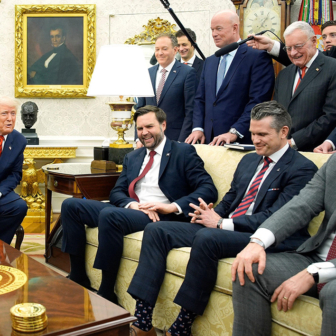WHEN I ARRIVED in London a year ago, all the talk was of “hedgies.” These were the inscrutible but cute-sounding creatures in charge of “hedge funds,” a term that was used with something like reverence. “He works in the City” was a phrase evoking mystery, but also abundant intelligence and fabulous wealth. A friend who had completed a Cambridge PhD in mathematics a decade ago, and who was now working for one of the big international finance houses, tried to explain to me what he did each day, but I was soon lost. In any case, the sun that long ago set on the British Empire had, it seemed, risen once again on the famous Square Mile, where a new breed of “gentlemanly capitalists” took on the world — not this time with pith helmets and gunboats but in Dolce & Gabbana suits and brandishing Blackberrys.
“Red” Ken Livingstone, then mayor of London, was no less enthusiastic about the flow of capital into the City’s financial institutions than the highest of High Tories. Indeed, both the Conservative Party and New Labour seemed to have long given up any idea that Britain might actually make things that the rest of the world wanted. But perhaps I am being harsh, for financiers were indeed “making things”: they were manufacturing derivatives valued in their trillions. Demand for them in the global financial markets seemed as insatiable as it had once been for the textiles turned out by dark Satanic mills in the heyday of industrial capitalism.
Soon, I learned that there was nothing particularly cute about “hedgies.” Articles started appearing in the papers advising readers on how to avoid them at parties, with their talk of expensive art, yachts, skiing holidays and exclusive schools for their children. Occasionally, you’d see a piece in the weekend papers with a theme along the lines of “My Years as a Hedgie”, which would provide lurid details of the author’s activities in the world of high finance, possibly ending with an account of what a happier and more balanced life they were able to lead once they’d left the industry.
The hedgies, it soon materialised, were essentially the British equivalent of Tom Wolfe’s “Masters of the Universe.” The local variety did their obscure stuff with Credit Default Swaps in plush Mayfair offices and lived in multi-million pound luxury pads while the rest of us – the chumps – paid higher rents for the privilege of inhabiting former council houses in London’s absurdly inflated property market.
When I walked through the London School of Economics late last year, as I do most mornings on the way to my own university, I noticed from a poster on the wall that students had even formed a “Hedge Fund Society”. After the conservative philosopher Michael Oakeshott delivered his inaugural lecture as a professor at the LSE in the early 1950s, the Labour parliamentarian, Richard Crossman, accused him of wanting to destroy the “School dedicated by the Webbs to the scientific study of the improvement of human society.” I couldn’t help but wonder what Crossman and the Webbs would have thought of the LSE Hedge Fund Society.
A year on, I’ve seen no trace of the LSE Hedge Fund Society on my walk to work, but suspect it’s been superseded by the Entrepreneurs’ Society, which in light of all that’s happened over the last year has a slightly less confronting aspect – so long as you didn’t live in Australia in the 1980s. Much more in evidence, however, are posters telling me that one stockbroker is one too many and we’re not going to pay for their crisis. And every day in the papers, I read of the latest bank “nationalisation.”
I was startled when I first heard that term over here, used in connection with the government’s rescue of the failing Northern Rock a few months ago. It seemed, at best, a journalistic figure of speech, shorthand for a government bail-out, a temporary measure applied to a single institution that had run into trouble. Now, it’s part of the everyday language of politics, and some commentators have been criticising the British government for only taking a stake in some of the banks – those in the most difficulty – rather than the lot of them. Full-scale nationalisation of the banking sector is being discussed as a realistic political option, no longer as the fantasy of some socialist sectarian or populist maniac. As “New Labour” enters what may well be the final years of its rule, such an outcome must until recently have seemed about as likely as the return of cloth caps and pigeon-fancying.
The financial crisis is, of course, an international phenomenon. But London’s a town that survives on banking; indeed, it has long promoted itself as the world’s banker, and embraced radical deregulation of the financial sector to make it happen. In colonial Australia, it was said, conversation quickly turned to horses and sheep. In London, for many, it soon turns to the finance markets. You could sense the gathering alarm when, as they travelled home in their millions by tube or bus in mid-September, they saw on the front pages of the give-away papers pictures of downcast Lehman Brothers staff walking disconsolately out of their Canary Wharf offices, each carrying a pathetic-looking box of their personal belongings: 5000 of them thrown out of work in the space of about a day. You don’t need much imagination, if your job is selling mobile phones on the High Street for £18,000 a year, to see that what can happen to an employee of one of the world’s largest investment banks today could be your fate tomorrow.
Paradoxically, this crisis has been very good for Gordon Brown. Just a few weeks ago, his demise was taken for granted – probably sooner in a party-room coup but if not, then assuredly later at the hands of voters. The last year of his prime ministership has been truly awful, with one humiliation only dissolving as it was overtaken by another, often worse than the previous one. But in the last few weeks, he’s looked for the first time like a prime minister. Brown’s been widely praised for his response to the crisis, and especially for his international financial diplomacy, and some commentators have even dared to suggest that it might be the beginning of a comeback. It possibly helps him that his opponents in the Tory Party, the likes of opposition leader David Cameron and shadow chancellor George Osborne, look and sound rather like the thirty- and forty-something whiz-kids who have just wrecked the country while accumulating their millions.
Even more than New Labour, the Tories remain wedded to the deregulated capitalism that many are now blaming for the mess we’re in. And after a period when they tried to outflank Labour on the left on some issues such as the environment, they’re now treading more uncertainly and sometimes – when they say we simply can’t afford stronger labour rights at times like these, for instance – they are reverting to type. Cameron is now criticising “irresponsible capitalism and irresponsible government”: for there is no end to the chutzpah of elected officials. Brown, on the other hand, up to his elbows in the culture of cowboy finance capitalism that occurred on his watch as chancellor, clearly sees an opportunity not merely to alleviate a crisis and effect his own political recovery, but to play the role of a British FDR in bringing into being a new post-crisis order. •




